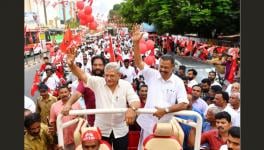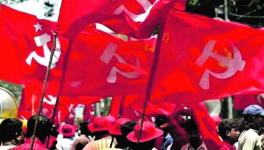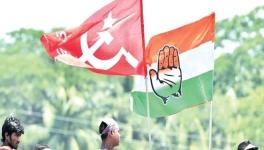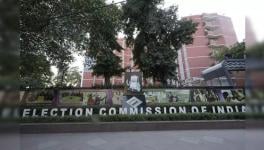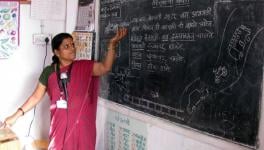"People are with Us Because of Our Work", Jitendra Chaudhury, MP, Tripura
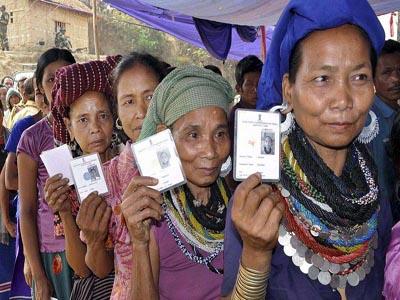
Question: We see that there is lot of discrimination against people from the northeast in Indian cities. There are also attacks on them. What are the measures you think should be taken to tackle this?
Jitendra Chaudhury: Actually, this type of discrimination is in-built in our society. This is because India is so huge with diverse culture and distinct linguistic barriers, etc. There is a need to give exposure to people from other parts of the country about the northeast so that they accept that the Northeast people are also part and parcel of the country. It is because vast sections of the people in the mainland are not aware of northeast. Also, an environment should be created by giving more opportunity so that people from the Northeast can participate actively in different fields of the national mainstream. Secondly, the northeast people are also suffering because of their isolation. Although at an individual level, they are very much knowledgeable and if you see their literacy rate and educational levels, these are not that low as compared to other parts of the country. However, this is not enough for an individual or for a section of people to get absorbed in the mainstream. Their capacity has to be built. The Indian government in a federal structure should have taken this initiative, but it has not done so. Owing to the issue of employment, we see that the northeast youth are often attacked by locals when they get absorbed in any particular job in metro cities. It is because of this that such racial discrimination takes place. Law and order agency such as the police also come from the same society and do not know how to behave or deal with such kinds of situation. The societal arrangement is such that these things keep happening.
The government of India should create an environment where the rest of the country should know about the culture, people, and population of the northeast. That kind of conducive environment has to be created in other part of the country. It is the responsibility of the government to see that this is done. It is not only about creating space for people of this region, but also space has to be created in the minds of the mainland people. Northeast is a region with distinct culture, different language, people, and population. And therefore in our literature and other things, the presence of this kind of diversity is required. This way people will believe that the northeast people are very much a part and parcel of this country. This way we can minimize the discrimination taking place in different parts of the country against people of the northeast. I do not only suggest a stringent law to tackle this situation. Law may be one of the steps, but not the only measure to deal with this. If this is done, people of the northeast will also feel that this is my country, and the rest of the country will accept the former as their brethren. A favourable environment can be created in this way.
Question: After the recent Bangalore incident targeting youth from the northeast you suggested some steps to be taken.
Jitendra Chaudhury: There was no time to explain this incident in the Parliament and so very quickly I had told that there should be some law like an ‘Anti-Racial Act’. Secondly, like in Delhi after the attack on a student from Arunachal Pradesh, Special Cell was formed where a police officer was appointed to not only take care of law and order, but also to liaison with different institutions. In Delhi, such incidents have now come down to an extent. So, a similar thing should be done in Bangalore, Chennai, Mumbai and other cities where a lot of students from the northeast are pursuing higher education and are also getting involved in different kinds of employment. If such steps can be taken, then I think things will be better.
Question: You have actively participated in the discussion on the proposed Amendment of the Sixth Schedule of the Constitution in Lok Sabha and suggested changes. What are these?
Jitendra Chaudhury: The provision of the Sixth Schedule in the Constitution of India was enacted in the early 1950s, and since 1952 it was implemented in the state of undivided Assam. Later, Assam was divided into Assam, Meghalaya and Mizoram. Initially, the Sixth Schedule provision was for only these three states. It was extended in the state of Tripura since 1985. But there is a different feeling today. Initially the Sixth Schedule was meant to only protect land. The outsiders, i.e. the non-tribals could not occupy the lands of tribals and alienation could not take place as such. But today only protection of land will not suffice. What is also important for the tribal people is their socio-economic development. In order to bring about socio-economic development, the government should create that space so that people can participate in the planning process and in its implementation. That way the sense of owning, the sense of belonging will be felt by the people. Now after the 73rd and 74th Amendments of the 1990s what are the changes that we see? Where the three-tier panchayat system has been working well, we see that the attitude of the people to development has rapidly changed. In Tripura, we see that a part of the state is under the three-tier system as well as the Sixth Schedule. In the areas governed by Sixth Schedule, we see that there is some elected system through the government’s legislation, but there is no intermediary body at the block level. There is no elected body at the district level unlike the three-tier panchayat system. There we see the difference. The land is protected which is fine, but there is no participation in the planning process. What I am suggesting is that this Sixth Schedule of course land is important, but for ensuring the socio- economic development, provisions like the 73rd Amendment should also be brought in. This is the first point.
Secondly, in the Sixth Schedule there is no provision for urban development. But in the states of Tripura, Meghalaya or Mizoram, urbanization is taking place; urbanisation is a world-wide phenomenon. There is no provision of fund-flow, to set up any elected body in the urban areas under the Sixth Schedule in these states. This should also be thought of when the discussion on amending the Sixth Schedule is going on. It should be done like the 73rd Amendment in the rural areas and 74th Amendment in the urban areas.
The third point is to do with funds. When the Planning Commission was in place we saw that funds were disbursed smoothly, but after its dismantling there is no proper source. NITI Aayog initially provided some ad-hoc funds, now we have realized that the funds that were released in 2016-17 have come down to almost half of 2014-15. How will this fulfil the aspirations of the people? There is also the question of properly utilising these funds. And that is why, in the Sixth Schedule amendment process, planning and implementation process should be taken care of.
Question: What are the challenges for the tribal people and the northeast in the absence of Tribal Sub-Plan (TSP)? Also, what is the current status of the Special Category Status for the northeast?
Jitendra Chaudhury: Modi government has initiated this experiment. What they have done this year is that the plan and non-plan structure has been dismantled. In the earlier system under the sub-plan, the amount was used for the development of the STs and SCs. What the government has done now is that they have made a basket of welfare schemes for the STs and SCs. What we see is that in this basket many things have been included which are of general nature. For STs and SCs, development does not only depend on monetary allocation; what is required is a special room for them for their social and cultural upliftment. Therefore, the provision of sub-plan is a necessity. Today the Modi government is naming and re-naming it. They can rename it, but the special provisions in the sub-plan should not be at par with the general programmes. The special room that was created for the STs since 1974 and SCs since 1979 should be continued.
There is one more thing. We see that even through this provision was there, the desired goal could not be achieved. There was some lacuna there too. The lacuna is that the fund was allocated but implementation was not effective. What we are proposing under the new formulation is that the fund allocation alone will not suffice. Right from the Central government to the state government there should be some kind of legislation to see its utilisation. We demand that the proportionate amount of fund be released [according to the population of STs] and that it is properly utilized. If this is done then within the targeted period we will be in a position to achieve its goal.
Question: What about the special category status for the northeast that was there earlier?
Jitendra Chaudhury: As far as special category status is concerned, we are still enjoying in the states of the northeast. As far as schemes are concerned, for the other states it has been 50:50, but for the states of the northeast it has always been 90:10 or 80:20. However, due to our agitation and bargaining with the government, it is being continued. We have also requested the PMO to have consultation with the MPs across the party line there and it has also been discussed in the North Eastern Council (NEC).We have demanded that the funds allocated for the states in the northeast should be optimally utilized and more targeted goal could be achieved collectively.
Question: Last year, the Forest Rights Act (FRA) completed 10 years. What do you think are its main achievements and challenges?
Jitendra Chaudhury: I would say that the FRA was a revolutionary legislation by the UPA I. But unfortunately, except the Left, other constituents of the UPA did not feel that the FRA should be implemented in the true spirit of its legislation. That is why if we see the data, all over the country both tribal and traditional forest dweller families are about 1 crore today. But titles have been conferred to only 70 lakhs, and the other 30 lakh requests have been outrightly rejected without giving proper justification. Also, a large percentage of tribals and traditional forest dwellers are not even aware that this kind of an Act has been exists. That is why the government should review why the Act has failed to achieve its goal. However, today we see that this government is very reluctant to do so and their attitude is not to go ahead with this Act; rather they want to dilute it in different ways. And they are very much keen to liberalise the diversion of forests for the corporate, for monopoly capital in order to extract minerals and other things including land. By this, the Adivasis and the forest dwellers will be evicted from their habitat. This is a very crucial thing now and should be agitated by the democratic section of the people. In this way, crores of Adivasis will have to face disaster in the future.
Question: Let us come to your home state Tripura. There is a lot of talk in the media about the growth of the BJP in Tripura. What do you have to say about this?
Jitendra Chaudhury: Although the BJP has numerically increased its presence in Tripura, the divide in Tripura historically has been between the Left and the anti-Left forces. Tripura’s polarization has been like that. Congress was the main opposition, but when the Congress supporters saw that they have no future at the national level, they have been shifting en block towards the BJP. Therefore, BJP has grown in Tripura at the cost of the other non-left supporters. Earlier, the main opposition was the Congress, now it is the BJP. However, there is no change in the correlation of the class forces as such.
Question: The Assembly election in Tripura will take place in February 2018. What will be the Left Front’s main agenda?
Jitendra Chaudhury: Left Front’s agenda from the very beginning has been all-round development of the people. Of course, we say that nothing like the socialist countries can be achieved within the existing system.Still, within the scope of the Constitution and the limited resources of the state, if any government has the pro-people agenda, it can achieve a lot and place some kind of an alternative in front of the people and the nation. And in Tripura we are doing that. This can be seen if you compare Tripura with any of the mainland states in terms of the Human Development Index (HDI); we have tried to ensure basic amenities and support to all the people. Of course, the task of improving the quality of life, etc will remain.
We do not believe in the kind of development that is being pursued by the BJP at the Centre or the development that was earlier pursued by the Congress. We firmly believe in the development of the downtrodden, the underprivileged, the commoners; whatever the benefits that the government can really extend, these sections of the society should be the priority. We have been doing this in Tripura and we will do that in future too. And people are with us because of our work.
Question: What do you have to say about the current political situation in the country, especially increasing communalization, vigilantism, etc?
Jitendra Chaudhury: Actually, this is the philosophy of this government. The RSS’s philosophy rests on the fact that the commoners, the Dalits and Adivasis and others should keep toiling. They should only their blood and sweat and should never enjoy the fruits of development. So, that is the philosophy of RSS/BJP. Accordingly, if we see the agricultural, industrial and education policies of this government, everything is based on their political philosophy. And to implement this philosophy they need the kind of politics what we are seeing today. In the name of religion, culture, etc they want to create divisions among social groups and polarise them, and thus destroy the social and secular fabric of the nation. The cow vigilante groups are attacking people everywhere. They may be successful for some time, for example, in the biggest state of the country [UP], the BJP has come to power. However, it should not be taken for granted that the people have accepted the political and economic policies of this government. It is also because of the failure of the parties in that state and so the people resented against them. The orders passed by Yogi Adityanath are only creating divisions among people. For the time being, this is very alarming for the society and the country, but in the long run this will not succeed because we have the legacy of the anti-imperialist movement in our blood. Although the secular and democratic forces of the country are not united for the time being, gradually they are expressing themselves and coming out and the day is not far when they will overcome the communal forces.
Get the latest reports & analysis with people's perspective on Protests, movements & deep analytical videos, discussions of the current affairs in your Telegram app. Subscribe to NewsClick's Telegram channel & get Real-Time updates on stories, as they get published on our website.









